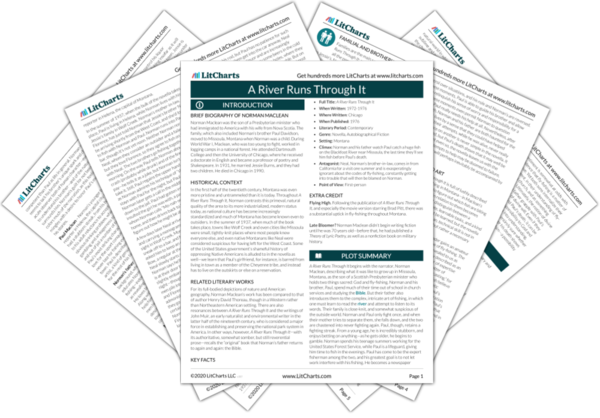The sect of Christianity followed by Maclean’s father, a “Scot and a Presbyterian,” teaches that humans are a species fallen from an original state of grace. In this religious framework, which is threaded throughout the book, it is believed that only God can restore grace to people. Though human beings can develop specific skills, even reaching the realm of art, it may be impossible for them to ever truly recover grace while still alive on earth. Throughout the book, Maclean portrays characters as alternately touched by grace and condemned to the opposite: disgrace. Such disgrace is sometimes linked to shame, as in the naked bodies of Neal and the Old Rawhide discovered by Paul and Norman. Like Adam and Eve, the original subjects of the fall from divine grace, this couple now must be ashamed of their nakedness as tied to their sins.
While disgrace in the book stems from human activity, grace is another thing entirely: it comes not from the human but from the divine. Norman and Paul’s father holds the most radical version of this belief. For him, even fly-fishing can only succeed with God’s grace. This sentiment is somewhat at odds with Norman’s and Paul’s confidence that fly-fishing is a matter of skill and art, as detailed above. Yet both sons internalize their father’s belief to a certain extent, in their understanding of fly-fishing as something as holy as church, and as something beyond human comprehension. Ultimately, the notion of divine grace helps both Norman and his father grapple with Paul’s death by fitting it into the concept of divine will. Even if they cannot fully accept that God is behind Paul’s death, it can be comforting for them to hand over responsibility to God and thus transform a sense of helplessness into understanding. Despite this, however, Norman is never entirely sure whether Paul is touched by divine grace, or whether his death shows that God chose not to bestow grace upon him—a possibility that Norman finds excruciating.
Grace, Disgrace, and Divine Will ThemeTracker

Grace, Disgrace, and Divine Will Quotes in A River Runs Through It
As a Scot and a Presbyterian, my father believed that man by nature was a mess and had fallen from an original state of grace. […] As for my father, I never knew whether he believed God was a mathematician but he certainly believed God could count and that only by picking up God’s rhythms were we able to regain power and beauty. Unlike many Presbyterians, he often used the word “beautiful.”

Unlock explanations and citation info for this and every other A River Runs Through It quote.
Plus so much more...
Get LitCharts A+My father was very sure about certain matters pertaining to the universe. To him, all good things—trout as well as eternal salvation—come by grace and grace comes by art and art does not come easy.
Rhythm was just as important as color and just as complicated. It was one rhythm superimposed upon another, our father’s four-count rhythm of the line and wrist being still the base rhythm. But superimposed upon it was the piston two count of his arm and the long overriding four count of the completed figure eight of his reversed loop.
The canyon was glorified by rhythms and colors.
Something within fishermen tries to make fishing into a world perfect and apart—I don’t know what it is or where, because sometimes it is in my arms and sometimes in my throat and sometimes nowhere in particular except somewhere deep. Many of us would probably be better fishermen if we did not spend so much time watching and waiting for the world to become perfect.
The cast is so soft and slow that it can be followed like an ash settling from a fireplace chimney. One of life’s quiet excitements is to stand somewhat apart from yourself and watch yourself softly becoming the author of something beautiful, even if it is only a floating ash.
Then he told me, “In the part I was reading it says the Word was in the beginning, and that’s right. I used to think water was first, but if you listen carefully you will hear that the words are underneath the water.”
“That’s because you are a preacher first and then a fisherman,” I told him. “If you ask Paul, he will tell you that the words are formed out of water.”
“No,” my father said, “you are not listening carefully. The water runs over the words. Paul will tell you the same thing.”
“After you have finished your true stories sometime, why don’t you make up a story and the people that go with it? Only then will you understand what happened and why. It is those we live with and love and should know who elude us.”
Eventually, all things merge into one, and a river runs through it. The river was cut by the world’s great flood and runs over rocks from the basement of time. On some of the rocks are timeless raindrops. Under the rocks are the words, and some of the words are theirs.
I am haunted by waters.











